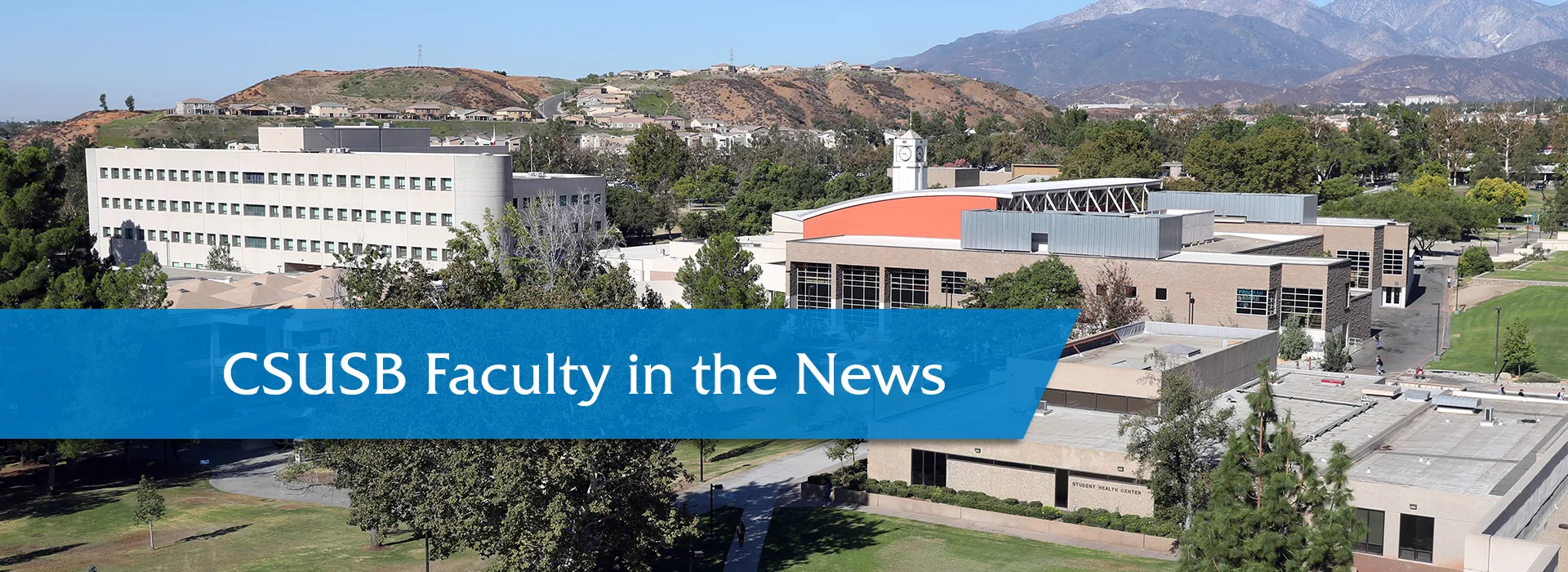NOTE: Faculty, if you are interviewed and quoted by news media, or if your work has been cited, and you have an online link to the article or video, please let us know. Contact us at news@csusb.edu.
Uptick in anti-Semitism worries CSUSB professorLAistOct. 30, 2018The Pittsburgh synagogue shooting is believed to be the deadliest attack on Jews in America's history. It comes amid an increase in anti-Semitic incidents around the country, including in Los Angeles County.Of the 101 religiously motivated hate crimes reported last year in L.A. County, 72 percent targeted the Jewish community, according to L.A. County's Commission on Human Relations. That's up from 69 percent in 2016.The uptick in anti-Semitism worries Brian Levin, who runs the Center for the Study of Hate and Extremism at California State University, San Bernardino. He says hate incidents against Jews were on the decline before 2014.'We've had dramatic demographic changes, we've had the rise of white nationalism and this growing distrust in the institutions have held us together,' said Levin. 'If there's an anti-elitist bent in the air or some kind of over-the-top nationalism, Jews typically become the scapegoat.'African-Americans remain the group most targeted in L.A. County hate crimes, followed by those who are gay, lesbian and transgender, but Levin says Jewish communities continue to be targeted, especially in large cities like New York and Los Angeles.'Jews are going to be among the more prominent targets in major cities in part because white nationalists are taking their fight to blue places,' Levin said. 'But also because Jews tend to be represented more in major cities.'Read the complete article at “Why Jews are targeted in 72 percent of religious hate crimes in LA County.”
CSUSB professor discusses the rise of hate crimes in a CNN International interviewCNN via MSNOct. 30, 2018Brian Levin, director of the Center for the Study of Hate and Extremism at Cal State San Bernardino, was interviewed about the rise in hate crimes as part of the continuing coverage in the aftermath of the Pittsburgh synagogue shooting. The accused shooter had posted anti-Semitic statements on a social media site.“We saw this increase in anti-Semitic and other types of hate speech go up, dovetailing with the explosion of hate crime that took place election month 2016,” Levin said. “And what we’ve seen is this migration of hardcore hate mongers to places like Gab (a social media site) or VK (Vkontakte), the Russian Facebook, Telegram (a messaging app) and other places, as more commercial platforms have use the terms of service to get rid of these hate mongers.”Watch the complete video at 'The Rise of Hate Crimes.'
Cut off from mainstream social media, extremists congregate on other sites in ‘the darkest part of the internet,’ CSUSB professor saysTalking Points MemoOct. 30, 2018An article about Gab, a social media site similar to Twitter that has few restrictions on its users and where the suspect in the Pittsburgh synagogue shooting posted his anti-Semitic rants, included an interview with Brian Levin, director of the Center for the Study of Hate and Extremism at Cal State San Bernardino.“There will always be a platform for hateful individuals to ensconce themselves in,” Levin told TPM.Levin pointed out that as white nationalists, neo-Nazis and other extremists get booted from YouTube and Twitter, they moved over to Gab, the Telegram messaging app, and Vkontakte, Russia’s version of Facebook.“So here’s the conundrum: As we segregate these hate-mongers off of mainstream sites, they still get to migrate to bigoted echo chambers that populate the darkest parts of the internet,” Levin said.Read the complete article at 'Gab, Cesspool of Hate Where Pittsburgh Shooter Dwelled, Won't Be Gone For Long.'
Anti-Semites and white supremacists are ‘more emboldened,’ CSUSB professor saysThe Times of IsraelOct. 30, 2018In a blog reacting to mass killings that targeted houses of worship from the Christian, Islamic and Jewish faiths, writer Allen S. Maller quoted a CSUSB professor who researches hate crimes.“We’re not necessarily seeing a historic rise in anti-Semitism when you zoom out,” said Brian Levin, director of the Center for the Study of Hate and Extremism at Cal State San Bernardino. “But the anti-Semites and white supremacists are more emboldened.”Read the complete article at 'Are hate crimes indicative of a whole society or just crimes of hate?'
The rise of violent political extremism topic of program featuring CSUSB professorWPR (Wisconsin)Oct. 30, 2018The Wisconsin public radio station promoted its interview with Brian Levin, director of the Center for the Study of Hate and Extremism at Cal State San Bernardino. Levin was invited to talk about the Pittsburgh synagogue shooting and what could be fueling such incidents. Listen to the whole podcast at 'The Rise of Violent Political Extremism.'
CSUSB professor weighs in on why it’s so hard to scrub hate speech off social mediaKQED NewsOct. 30, 2018There’s a market for platforms like Gab, a haven for alt-right enthusiasts that was used by Robert Bowers, the man accused of killing 11 people in a Pittsburgh synagogue on Saturday. That troubles Brian Levin, who directs the Center for the Study of Hate and Extremism at California State University, San Bernardino.“What are the costs of segregating bigots into their own ecosystem, creating virtual universities for hate that aren't on the more well-known mainstream social media platforms?” Levin said.Read the complete article at 'Why it's so hard to scrub hate speech off social media.'
These news clips and others may be found at 'In the Headlines' at inside.csusb.edu.
